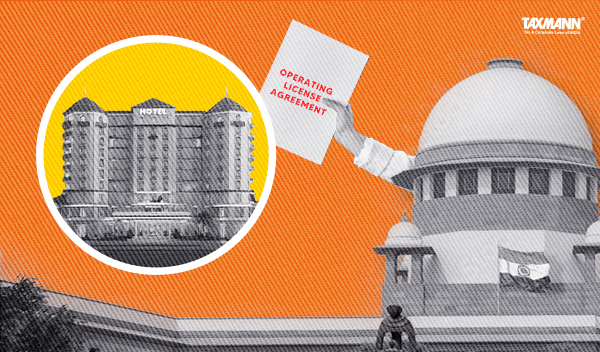Sum Received for Relinquishment of Right to Operate Hotel Under Operating License Agreement Is Revenue Receipt | HC
- Blog|News|Income Tax|
- 2 Min Read
- By Taxmann
- |
- Last Updated on 5 July, 2024

Case Details: PCIT vs. ITC Limited - [2024] 164 taxmann.com 88 (Calcutta)
Judiciary and Counsel Details
- Surya Prakash Kesarwani & Rajarshi Bharadwaj, JJ.
- Omnarayan Rai & Prithu Dudhoria, Advs. for the Appellant.
- J.P. Khaitan, Sr. Adv. & Ms Nilanjana Banerjee Pal, Adv. for the Respondent.
Facts of the Case
The assessee was engaged in various business activities. Under the Operating Licence Agreement with the owner, the assessee was granted a licence to operate the hotel ‘Sea Rock’ for 25 years with an option to renew the licence for a further period of 25 years. The assessee did not have any right, title or interest in the hotel in question.
Subsequently, the assessee entered a settlement agreement with the owner under which the settlement amount relating to the licence in question was received by the assessee from the owner as per the arbitrator’s award. While furnishing the return of income, the assessee treated such receipts as long-term capital gains. However, the Assessing Officer (AO) disallowed such a claim of the assessee and treated such amount as a revenue receipt.
On appeal, CIT(A) deleted the additions made by AO. Afterwards, the Tribunal dismissed the appeal, and the matter was reached before the Calcutta High Court.
High Court Held
The High Court held that from the recital of the “Operating License Agreement”, it was evident that the assessee was rendering services to the owner to run the hotel in question under an agreement which resulted in a trading cum service contract. The Operating License Agreement was entered during the usual course of its various business activities, including running /operating the hotel.
No right in the hotel in question was conferred upon the assessee under the License Operating Agreement except to run the hotel on certain terms and conditions with ensured income to the owner as part of business activity. Further, all the employees required to run the hotel were employees of the owner.
The termination of the agreement resulted from the settlement /compromise of all claims, counterclaims and disputes relating to the business contract, and in lieu thereof, the assessee received a compensation and not in lieu of its rights in any capital assets.
The said amount was part of the award by the Arbitrator as per consent terms. Thus, the amount received as per consent terms to settle/ compromise all disputes or, in any case, in the form of compensation for the loss of trading operation of running the hotel under the agreement and not for the loss of any asset of enduring value.
Under Article XVII of the “Operating License Agreement”, the owner had the sovereign right to terminate the agreement. Thus, the termination of the “Operating License Agreement” and payment of such amount by the owner to the assessee was revenue receipt in the hands of the ITC, not capital receipt.
Disclaimer: The content/information published on the website is only for general information of the user and shall not be construed as legal advice. While the Taxmann has exercised reasonable efforts to ensure the veracity of information/content published, Taxmann shall be under no liability in any manner whatsoever for incorrect information, if any.

Taxmann Publications has a dedicated in-house Research & Editorial Team. This team consists of a team of Chartered Accountants, Company Secretaries, and Lawyers. This team works under the guidance and supervision of editor-in-chief Mr Rakesh Bhargava.
The Research and Editorial Team is responsible for developing reliable and accurate content for the readers. The team follows the six-sigma approach to achieve the benchmark of zero error in its publications and research platforms. The team ensures that the following publication guidelines are thoroughly followed while developing the content:
- The statutory material is obtained only from the authorized and reliable sources
- All the latest developments in the judicial and legislative fields are covered
- Prepare the analytical write-ups on current, controversial, and important issues to help the readers to understand the concept and its implications
- Every content published by Taxmann is complete, accurate and lucid
- All evidence-based statements are supported with proper reference to Section, Circular No., Notification No. or citations
- The golden rules of grammar, style and consistency are thoroughly followed
- Font and size that’s easy to read and remain consistent across all imprint and digital publications are applied



 CA | CS | CMA
CA | CS | CMA
